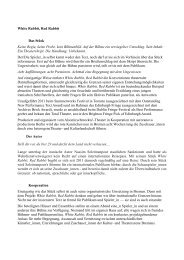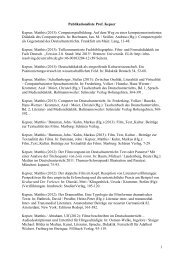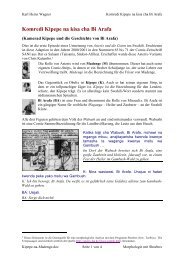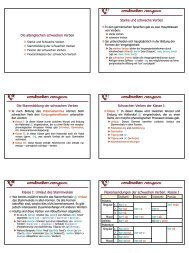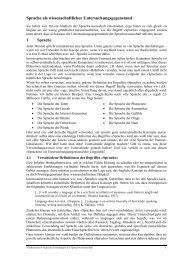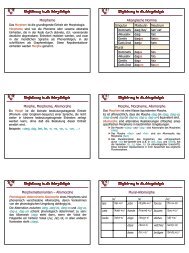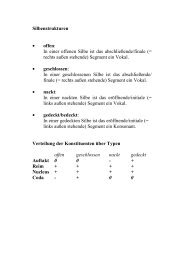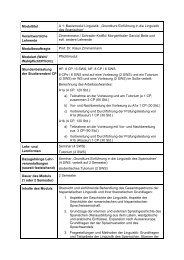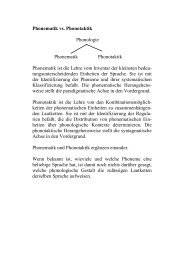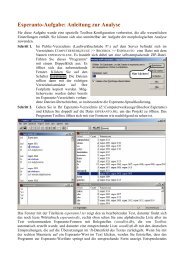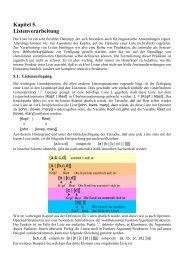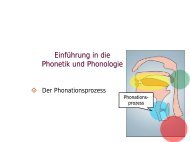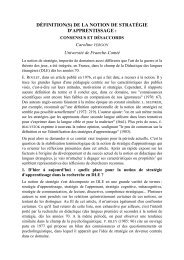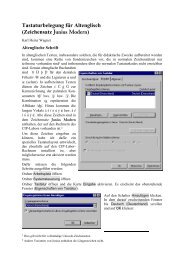Relativism and Universalism in Linguistics - Fachbereich 10 ...
Relativism and Universalism in Linguistics - Fachbereich 10 ...
Relativism and Universalism in Linguistics - Fachbereich 10 ...
You also want an ePaper? Increase the reach of your titles
YUMPU automatically turns print PDFs into web optimized ePapers that Google loves.
Workshop 1 – Abr 129<br />
Langacker, Ronald (2003). “Extreme subjectification: English tense <strong>and</strong> modals”. In: Hubert<br />
Cuyckens, Thomas Berg, René Dirven & Klaus Uwe-Panther (eds.) Motivation <strong>in</strong><br />
language: Studies <strong>in</strong> honour of Günter Radden, 3-26. [Current issues <strong>in</strong> L<strong>in</strong>guistic<br />
Theory 243]. Amsterdam/Philadelphia: John Benjam<strong>in</strong>s.<br />
Trnavac, Radoslava (2006). Aspect <strong>and</strong> subjectivity <strong>in</strong> modal constructions. Dissertation<br />
University of Leiden.<br />
The Aspect-Modality l<strong>in</strong>k <strong>in</strong> Serbian<br />
Drobnjakovic, Ana<br />
KU Leuven<br />
ana.drobnjakovic@arts.kuleuven.be<br />
Serbian, like other Slavic languages, shows only one type of aspectual opposition result<strong>in</strong>g <strong>in</strong><br />
two grammatical aspects: perfective <strong>and</strong> imperfective (Comrie 1993). Situated on the lexical<br />
level <strong>and</strong> therefore referred to as Aktionsart, this aspectual dist<strong>in</strong>ction implies that, with a few<br />
exceptions, each Serbian verb is either perfective or imperfective (Stanojčić & Popović 1997).<br />
Mak<strong>in</strong>g use of the Corpus of the Serbian Language (henceforth CSL), the aim of this paper is<br />
to <strong>in</strong>vestigate whether Serbian confirms a cross-l<strong>in</strong>guistically detected phenomenon accord<strong>in</strong>g<br />
to which deontic shows aff<strong>in</strong>ity to the perfective <strong>and</strong> epistemic to the imperfective aspect<br />
(Abraham 1990, 2005; Leiss 2002). A prelim<strong>in</strong>ary exam<strong>in</strong>ation shows that <strong>in</strong> Serbian deontic<br />
is, <strong>in</strong>deed, l<strong>in</strong>ked to perfective aspect <strong>and</strong> epistemic to imperfective aspect (1a- b):<br />
[Glosses: PRS=present, IMPF=imperfective, PFV=perfective, PST-past, IMPR=impersonal; E(pistemic), D(eontic)]<br />
DISTRIBUTIONAL AKTIONSART SENSITIVITY (cf. Abraham 2005: 248f.) D-read<strong>in</strong>gE-read<strong>in</strong>g<br />
(1) a Mora da radi + +<br />
must-prs that work-ipfv<br />
‘He must work /He must be work<strong>in</strong>g’<br />
b Ona mora da postane lekar + −<br />
she must-prs that become-pfv doctor<br />
‘She must become a doctor’<br />
However, the aff<strong>in</strong>ity between deontic <strong>and</strong> perfective, on one h<strong>and</strong>, <strong>and</strong> epistemic <strong>and</strong><br />
imperfective, on the other, is detectable <strong>in</strong> Serbian only when the modal is <strong>in</strong> the 3 rd person<br />
s<strong>in</strong>gular, present tense, as is the case <strong>in</strong> (1). The reason for this is that Serbian has a way of<br />
encod<strong>in</strong>g for deontic <strong>and</strong> epistemic mean<strong>in</strong>gs other than aspect: The impersonal form (3r<br />
person s<strong>in</strong>gular, present tense) of a Serbian modal has to be used, when an epistemic mean<strong>in</strong>g<br />
is to be communicated (2):<br />
D- read<strong>in</strong>gE-read<strong>in</strong>g<br />
(2) a Moraju da rade + −<br />
must-3pl.prs that work-3pl.prs<br />
b Mora da rade − +<br />
impr that work-3pl.prs<br />
And yet, when epistemic modal is <strong>in</strong> the past tense, the impersonal form of a modal is no<br />
longer the element enabl<strong>in</strong>g the dist<strong>in</strong>ction between deontic <strong>and</strong> epistemic mean<strong>in</strong>g, the<br />
f<strong>in</strong>iteness of a ma<strong>in</strong> verb now beg<strong>in</strong>n<strong>in</strong>g to play an important role (3a-b):<br />
MV EMBEDDING UNDER MV (cf. Abraham 2005: 246) D- read<strong>in</strong>g E-read<strong>in</strong>g<br />
(3) a Morali su da idu + −<br />
must- 3pl.pst that go-3pl.prs<br />
‘They had to go’<br />
Morali su ići + +<br />
must- 3pl.pst go-<strong>in</strong>f



